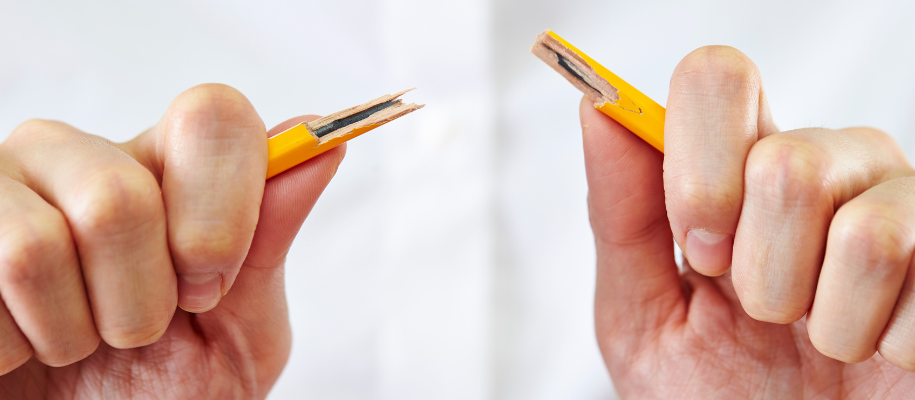Anyone who has ever worn their hair in a ponytail knows the struggle of an elastic snapping as you try to loop it around one too many times. As an overachiever, I tend to be like that ill-fated hair elastic. Not wanting to accept my limits, I can easily stretch myself too thin—to the snapping point. A broken hair elastic isn’t useful to anyone, and neither is a stressed student. That’s why it’s important to detect when you’re approaching your snapping point and deal with stress in a healthier way.
Very rarely does anything snap without warning. People are the same. We feel our stress mounting, pulling us in different directions, wearing us down. Of course, signs of stress-related burnout are different for everyone. You might snap at friends or family without meaning to. You might be tired, withdrawn, and unmotivated in classes or after-school activities. Let’s look at ways to address this stress before it goes too far.
Respond to your stress
At this point in high school, you probably know how to detect your burnout point, but you might not always acknowledge it. Just like with the hair elastic, you might believe you can do just one more thing―stay up just a little longer to study, fill in that single free hour in your day, say yes to one more responsibility in your group project—but there comes a point when that one extra choice is just too much. Responding to your stress is easier said than done. When you’re in the habit of rushing around doing a million things simultaneously, pausing and taking a breath can seem impossible. But simply sitting still for a bit and letting your mind relax can do wonders for you, so if you start feeling overly stressed, acknowledge and do something about it. Don’t ignore it!
Adjust an overloaded schedule
Taking a short break from your responsibilities does not mean you’re giving up on it, and it certainly does not mean that you won’t excel at it. Guess what: successful people take breaks! All successful people—entrepreneurs, CEOs, authors, actors—feel the pressures of a busy schedule and see the value of giving themselves a break. Recharging isn’t a luxury; it’s a necessity. I was reminded of this when the president of my high school class, salutatorian, and lead in our spring play, fell asleep in a few classes during drama club’s “hell week” (the week before a show opens). Even before she had rehearsals, my friend hardly ever slept. She said she was always afraid she’d miss something while she was sleeping. And she did miss something—she missed out on sleep. If your schedule is affecting your health and your academics, it’s not working and you need to change it.
Related: How to Make Time for Yourself and Your Hobbies With a Busy School Schedule
Find ways to rest and recharge
With a busy high school schedule, it’s important to work hard, but you also need to give your body the rest it needs. Arianna Huffington, founder of the Huffington Post compared the body’s need for rest to our smartphones. She pointed out that, while we are anxious to charge our iPhone when the battery icon turns red, we ignore our own body’s need to recharge. The next time you plug in your phone, use that as a reminder to “plug in” yourself too. Just like your phone, you can’t run on an empty battery. Teenagers need 8–10 hours of sleep a night, and it’s important to respect our bodies’ need for rest. It’s virtually the only way to maintain clear thinking and abundant drive. Everyone is limited to the same 24-hour day, and there will always be something we don’t get to in a day. But rest shouldn’t be one of them!
Get help from your community of peers
Maybe you feel the same way as my friend and are afraid you’ll miss out on something important if you take a break, or perhaps you feel you might let someone else down if you put your needs first. But you don’t have to carry everything alone. When my high school schedule got crazy, I was having trouble finding time to create a PowerPoint for my AP Lit study group that I usually made for all of us. Discouraged, I told them I couldn’t help them much, but their response surprised me. Instead of being angry with me, the entire class jumped right in, collaborating on a study sheet that we all used instead. It ended up bringing my whole class closer as we prepared for the exam together. I realized I didn’t always need to be the person who gave help. Sometimes I could be the person who needed help, and that’s okay.
Related: How to Be the Best Mental Health Ally as a Student
We overachievers tend to believe we need to take everything on ourselves or else it won’t get done―or it won’t get done “well enough.” But you can’t do everything yourself. It’s important to work hard and help others, but sometimes it’s necessary to admit when you’ve reached your limits. Otherwise, you’ll get so worn out to the point where you can’t help anyone, including yourself. There will be times in high school when you wish you could do more, but being realistic about your limitations is better than making promises you can’t keep.
We have all the tips and tricks you could possibly need to combat burnout in Our Best Advice for Dealing With Stress as a Student. Don’t wallow in it; do something about it!









